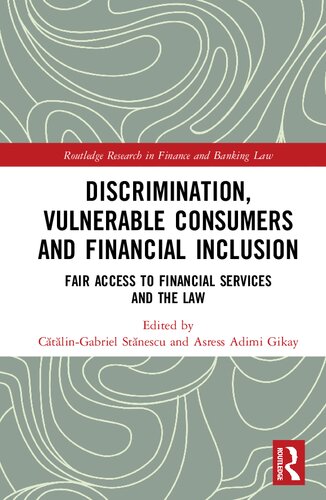

Most ebook files are in PDF format, so you can easily read them using various software such as Foxit Reader or directly on the Google Chrome browser.
Some ebook files are released by publishers in other formats such as .awz, .mobi, .epub, .fb2, etc. You may need to install specific software to read these formats on mobile/PC, such as Calibre.
Please read the tutorial at this link. https://ebooknice.com/page/post?id=faq
We offer FREE conversion to the popular formats you request; however, this may take some time. Therefore, right after payment, please email us, and we will try to provide the service as quickly as possible.
For some exceptional file formats or broken links (if any), please refrain from opening any disputes. Instead, email us first, and we will try to assist within a maximum of 6 hours.
EbookNice Team

Status:
Available4.5
24 reviewsThis book addresses the questions of discrimination, vulnerable consumers, and financial inclusion in the light of the emerging legal, socioeconomic, and technological challenges. New technologies – such as artificial intelligence-driven consumer credit risk assessment and Fintech platforms, the changing nature of vulnerability due to the ongoing COVID-19 pandemic, as well as the sophistication of digital technologies, which help circumvent legal barriers and protections – necessitate the continuous study of the existing legal frameworks and measures that are capable of tackling these challenges.
Organized in two major parts, the first addresses, from multiple national angles, the idea of a human rights approach to consumer law, in order to replace the mantra of economic efficiency that characterizes financial services with those of human dignity and freedom from discrimination and from debt-induced servitude. The second tackles the challenges posed by increased usage of technology in connection with financial services, which tends to solve, but also creates, additional issues for consumers in general, and for vulnerable groups in particular.